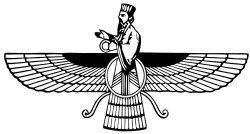| It has been suggested that this page be merged with Zurvanism. (Discuss) Proposed since April 2025. |
| Submission declined on 27 April 2025 by Robert McClenon (talk). The proposed article does not have sufficient content to require an article of its own, but it could be merged into the existing article at Zurvanism. Since anyone can edit Wikipedia, you are welcome to add that information yourself. Thank you.
Where to get help
How to improve a draft
You can also browse Wikipedia:Featured articles and Wikipedia:Good articles to find examples of Wikipedia's best writing on topics similar to your proposed article. Improving your odds of a speedy review To improve your odds of a faster review, tag your draft with relevant WikiProject tags using the button below. This will let reviewers know a new draft has been submitted in their area of interest. For instance, if you wrote about a female astronomer, you would want to add the Biography, Astronomy, and Women scientists tags. Editor resources
Once you save your changes using the "Publish changes" button below, you will be able to resubmit your draft for review by pressing the "Resubmit" button that will appear here. |  |
 Comment: This draft has information that is not in the article and should be added to the article. The article has information that is not in this draft. Please compare and combine the draft and the article.You may ask for advice about comparing and combining a draft and an article at the Teahouse. Robert McClenon (talk) 16:01, 27 April 2025 (UTC)
Comment: This draft has information that is not in the article and should be added to the article. The article has information that is not in this draft. Please compare and combine the draft and the article.You may ask for advice about comparing and combining a draft and an article at the Teahouse. Robert McClenon (talk) 16:01, 27 April 2025 (UTC)
| Zurvan God of Time and Fate | |
|---|---|
| General Information | |
| Other Names | Zarawan, Zaman |
| Avestan | Zruuan 𐬰𐬎𐬭𐬬𐬀𐬥 |
| Planet | Saturn (In some Sources) |
| Symbol | Eternal and Infinite Time[1] |
| Guardian of the Day | None[Note 1] |
| Relatives | |
| Children | Ahriman, Ahura Mazda |
| Part of a series on |
| Zoroastrianism |
|---|
 |
|
|
Zurvan (Avestan: 𐬰𐬎𐬭𐬬𐬀𐬥, romanized: zruuān) is a primordial deity in Ancient Iranian religion, which represents infinite time and space.[2] In the religious movement known as Zurvanism, Zurvan is regarded as the ultimate source of all existence, depicted as a god of fate, time, destiny, eternity, and the fixed order of the universe.[3]
The origins of Zurvanism are unclear, but scholars suggest that Zurvanism emerged as a branch of Zoroastrianism during the late Achaemenid or early Parthian period.[4] It became especially influential during the Sasanian Empire (224–651 CE), although it was never the official state religion.[5] Although Zurvan as a Yazata is not a major figure in mainstream Zoroastrian texts such as the Avesta, Zurvanism developed its own theological framework in which Zurvan was regarded as the father of the twin spirits Ahura Mazda (the god of light and goodness) and Angra Mainyu (the spirit of evil and destruction).
- ^ "گفتار دوم: زروان".
- ^ Zaehner, R.C. (1955). Zurvan: A Zoroastrian Dilemma. Oxford: Clarendon Press. p. 123.
- ^ Boyce, Mary (1979). Zoroastrians: Their Religious Beliefs and Practices. London: Routledge. p. 195.
- ^ Duchesne-Guillemin, Jacques (1962). La Religion de l'Iran Ancien. Paris: Presses Universitaires de France. p. 145.
- ^ Boyce, Mary (1979). Zoroastrians: Their Religious Beliefs and Practices. London: Routledge. p. 196.
Cite error: There are <ref group=Note> tags on this page, but the references will not show without a {{reflist|group=Note}} template (see the help page).
© MMXXIII Rich X Search. We shall prevail. All rights reserved. Rich X Search
